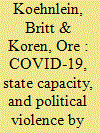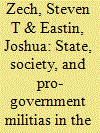|
|
|
Sort Order |
|
|
|
Items / Page
|
|
|
|
|
|
|
| Srl | Item |
| 1 |
ID:
184193


|
|
|
|
|
| Summary/Abstract |
The COVID-19 pandemic has constrained the ability of states across the world to govern and control their territories. As the state reduces its activities, space opens for violent non-state actors working for and against the state to fill the vacuum. Highlighting this trend, the present study evaluates the effects of COVID-19 and pandemics more broadly on attacks by non-state actors. Our theory emphasizes the incentives of both rebels and pro-government non-state actors (PGNs) to increase their attack frequency as disease spreads and the state retracts its governance activities to preserve resources needed elsewhere. In the first case, we highlight how the pandemic allows rebels to reduce asymmetries of power with respect to the military and establish themselves as a viable government alternative. In the second case, PGNs, which provide an alternative to militaries, are deployed to these contested spaces to thwart or pre-empt rebellion during the pandemic. Employing daily-level data on the annual change in armed conflict and COVID-19 cases across 127 countries between 1 January 2020 and 15 June 2020, we test both claims using an econometric identification strategy. We do not find clear evidence that COVID-19 led to a higher frequency of rebel attacks, suggesting that these groups prefer to bolster their standing using nonviolent means, or avoid fighting and preserve their resources. In contrast, we find that the frequency of PGN attacks has increased with COVID-19 prevalence compared with last year. Case studies of insurgent and PGN activity in Afghanistan and Nigeria lend additional support to these results, illustrating some underlying mechanisms. Our findings explore overlooked challenges that pandemics and other disasters pose to conflict mitigation and the role PGNs play in these contexts.
|
|
|
|
|
|
|
|
|
|
|
|
|
|
|
|
| 2 |
ID:
183841


|
|
|
|
|
| Summary/Abstract |
Militia groups have only recently started to attract scholarly attention in the literature on internal conflicts. This attention is mostly focused on either the causes of their emergence or their functions and performance during the conflict. The role of militia groups in post-conflict processes, however, has not been adequately addressed. This article intends to fill this gap by analyzing the case of village guards, a type of pro-government militia system in Turkey, based on qualitative evidence from field research. While the dominant narrative in the literature identifies militia groups as spoilers in peace processes, the article shows that militias do not act as spoilers under certain conditions. In the case of the village guard system in Turkey, the permanent integration of militias into the state’s regular military apparatus prevented militia groups from acting as spoilers. It then argues that the permanent integration of wartime militia systems is a consequence of two factors: militia networking and a lack of comprehensive peace-building structures.
|
|
|
|
|
|
|
|
|
|
|
|
|
|
|
|
| 3 |
ID:
191004


|
|
|
|
|
| Summary/Abstract |
Examining militia relationships with the government and civilian populations can help scholars and policymakers better assess differences in militia form, function, and behavior. In this article, we examine the Civilian Armed Forces Geographical Units (CAFGU), a pro-government militia in the Philippines, to better understand how militia participants view insurgents, politicians, state security forces, and civilians based on their experiences serving in the group. We argue that analyzing these beliefs is critical to understanding how militias influence civilian security and the risk of political violence in conflict-contested areas, as well as the trajectory of civil conflict in states like the Philippines that rely on militias to perform core security functions. We base the analysis on surveys and interviews with CAFGU members and civilians living in the Eastern Visayas, a region of active and ongoing conflict, where insurgents and other armed militants advance their aims through acts of violence and terrorism. In doing so, we contribute to a growing literature on the role that militias play in civil war, as well as the implications that follow when states choose to arm “civilians” to aid in counterinsurgency and conflict suppression.
|
|
|
|
|
|
|
|
|
|
|
|
|
|
|
|
|
|
|
|
|